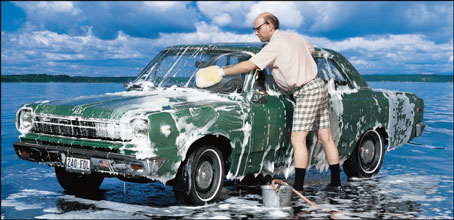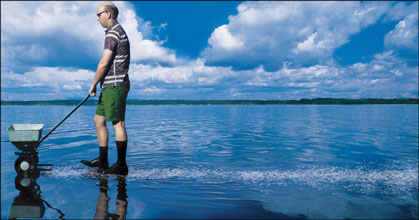Special thanks to Business View Magazine for featuring Harborcreek Township in the latest issue of their …
Overview and Definition of an MS4
Clean water is important to us because it provides us with drinking water, a place for recreation, and supports habitat for wildlife. Harborcreek Township has initiated a public education program on storm water management because of its effect on water quality. According to the United States Environmental Protection Agency, polluted storm water runoff is a leading cause of impairment to the nearly 40 percent of U.S. water bodies which do not meet water quality standards.
Harborcreek Township Pollutant Reduction Plan
Storm water is water from precipitation that flows across the ground and pavement when it rains or when snow and ice melt. Storm water travels over land. Sometimes the ground absorbs storm water, and it never reaches streams, rivers, and lakes. Other times storm water traveling over land eventually drains into a system of conveyances. This system is referred to as a municipal separate storm sewer system (MS4). By definition an MS4 is a system of conveyances that include catch basins, curbs, gutters, ditches, man-made channels, pipes, tunnels, or storm drains that discharges into waters of the United States. An MS4 moves water away from an area to a local water body. The EPA is now requiring certain urbanized municipalities to address storm water quality. The Pennsylvania Department of Environmental Protection has outlined a program for Municipal Separate Storm Sewer Systems (MS4's). In Pennsylvania Phase I of the program focused on large and medium sized cities above 100,000 population (Philadelphia, Pittsburgh, & Allentown). Harborcreek is one of about 900 municipalities in Phase II of the program. We are required to educate the public as part of a 5 year permit program.
NPDES Permits
A National Pollutant Discharge Elimination System (NPDES) permit is required for any point source discharge to waters of the Commonwealth. The Clean Water Program in DEP's regional offices issues the majority of NPDES permits for sewage, industrial waste (IW), IW stormwater, municipal separate storm sewer system (MS4), Concentrated Animal Feeding Operation (CAFO), biosolids and pesticides activities or facilities that are regulated under the NPDES program. The Bureau of Clean Water (BCW) in DEP's Central Office issues statewide General NPDES permits. If applicants qualify, they may be approved for coverage under a General NPDES permit.
For more information visit the NPDES website at: https://www.dep.pa.gov/Business/Water/CleanWater/WastewaterMgmt/Pages/NPDESWQM.aspx
Storm Water Runoff
When it rains, the draining water is called storm water runoff. Storm water can be a problem when there is a decrease in quality and an increase in quantity. Development can alter the natural pathway that storm water takes to travel over land, and increases the rate at which it travels over the land by changing porous surfaces (soil) to non-porous, or impervious surfaces (pavement). Natural surfaces, such as soil, act as a filter for storm water and clean it as it infiltrates into the ground.
When a pervious surface is converted into an impervious surface, pollutants on the surface are collected by the storm water as it travels over the land, and deposits them into water when it discharges from the MS4. As a result of developed and disturbed land, storm water becomes a problem because the quality of the storm water runoff decreases as it accumulates pollutants that collect on the ground. Pollutants concentrated in storm water runoff eventually decrease the overall water quality of lakes, rivers, and streams that receive storm water discharges. The quantity and speed of storm water runoff moving over the land increases. This means that a greater volume of polluted runoff is reaching our lakes, rivers, and streams at a faster pace. This can result in flooding, as well as more polluted waters. As the amount of impervious surfaces in our community increases by creating more roads, rooftops, and parking lots, the quantity of storm water increases. If the storm water system cannot drain the runoff from impervious surfaces quickly enough, flooding can result. Storm water runoff picks up litter from streets and carries it to storm drains. Sometimes litter will clog an inlet and make it difficult for storm water to drain properly. This could lead to flooding if the drain is clogged enough. Storm water runoff can also contribute to erosion from areas that do not have vegetative cover, such as construction sites. We can see pollutants such as sediment. Pollutants that we can't see, such as bacteria and toxic chemicals, could result in illness. Thermal impacts from storm water runoff heating up as it travels over hot pavement can harm aquatic life that need cool water to survive. Illicit discharges, such as dumping antifreeze down a storm drain, are an example of how a contaminant can enter the storm sewer system and contribute to storm water contamination. It is important to understand that wastewater from the sanitary sewer system gets treated. Storm water traveling trough a separated storm sewer system never gets to a treatment plant. It discharges directly to our water, along with everything it picks up on its journey over the land. Storm water, which does not get treated, becomes a problem when it picks up debris, chemicals, dirt, and other pollutants as it flows eventually reaching a lake, river, stream, wetland, or coastal water.
- Never pour any hazardous substance such as used oil, cleaning supplies and paint down any part of the storm sewer system.
- Use pesticides and fertilizers sparingly to prevent excess runoff.
- Never dump automotive fluids into storm drains.
- Correct motor vehicle leaks (vehicles drip fluids such as oil, grease, gasoline, antifreeze, and brake fluid).
- When walking your pet, pick up the waste and dispose of it properly. Leaving pet waste on the ground increases public health risks by allowing harmful bacteria to wash into the storm drain and eventually into local water bodies.
- Sweep up litter and debris from sidewalks, driveways, and parking lots especially around storm drains to avoid having it wash into the storm sewer system.
- Sediment can cloud the water and make it difficult or impossible for aquatic plants to grow.
- Bacteria can wash into swimming areas and create health hazards.
- Plastic bags, six pack rings, bottles, and other debris washed into water bodies can disable aquatic life such as ducks, fish, turtle, and birds.
- Household hazardous wastes such as insecticides, pesticides, paint solvents, used motor oil, and other auto fluids can poison aquatic life. Land animals and people can become sick or die from eating diseased fish or ingesting polluted water.
- Polluted stormwater can affect drinking water, which can affect human health and increase drinking water treatment costs.
- Waste from chemicals and materials used in construction can wash into the storm sewer when it rains.
PA DEP Car Wash Poster![]()
![]() –
“When you’re washing your car in the driveway, remember you’re not just washing your car in the driveway.”
–
“When you’re washing your car in the driveway, remember you’re not just washing your car in the driveway.”

Construction
The construction industry has a key role to play in storm water management. As storm water flows over a construction site, it can pick up pollutants such as sediment, debris, and chemicals. Uncontrolled erosion can have a significant financial impact on a construction project. It costs time and money to repair gullies, replace vegetation, clean sediment clogged storm drains, and mitigate damage to other people’s property. At a construction site, it is important to protect the natural features by:
- Minimizing the amount of exposed soil, because the less soil that is exposed the easier and cheaper it will be to control erosion.
- Identify and protect areas where existing vegetation such as trees will not be disturbed by construction activity.
- Protect streams, wild woodlands, wetlands, and other sensitive areas from any disturbance or construction activity by fencing or otherwise clearly marking those areas.
Where ever possible sequence construction activities so that the soil is not exposed for long periods of time. Schedule site stabilization activities such as landscaping to be completed as quickly as possible after the land has been graded to the final contour.
Silt fencing
- Inspect and maintain silt fences after each rainstorm.
- Make sure the bottom of the silt fence is buried in the ground.
- Securely attach the material to the stakes.
Construction entrances
- Make sure the construction entrance doesn’t become buried in soil.
- Regular street sweeping at construction entrance will prevent dirt from entering storm drains.
Installing and maintaining pollution prevention techniques on site can reduce the potential for storm water pollution and help protect our nation’s water supply.
PA DEP Construction Industry Storm Water InformationFertilizer
Excess fertilizers and pesticides applied to lawns and gardens wash off and can pollute streams. Use pesticides and fertilizers in accordance with the manufacturer’s recommended amount. Never leave yard waste in the street and don’t sweep it into storm drains or streams.
PA DEP Fertilizer Poster![]()
![]() –
“When you’re fertilizing the lawn remember, you’re not just fertilizing the lawn.”
–
“When you’re fertilizing the lawn remember, you’re not just fertilizing the lawn.”

Vehicle Maintenance
Repair motor vehicle leaks and never dump into a drain, or ditch used motor vehicle fluids such as solvents, antifreeze, brake fluid, and motor oil. When it rains or snows, the flowing water can carry oil, antifreeze, and other fluids away ending up in streams, rivers, and lakes killing aquatic life and seriously polluting water bodies where people swim, fish, and boat. If you see a leak from your motor vehicle, contain it with a drip pan or absorbent material and clean up the residue from the ground. When spills and leaks happen, clean up as much fluid as you can as quickly as possible. Don’t mix used oil with solvents, brake cleaner, or antifreeze, because this creates a hazardous waste.
PA DEP Oil Slick Poster![]()
![]() –
“When your car’s leaking oil on the street, remember it’s not just leaking oil on the street.”
–
“When your car’s leaking oil on the street, remember it’s not just leaking oil on the street.”

Pet Waste
Pet waste can be a major source of bacteria and excess nutrients in local waters. When walking your pet, pick up the waste and dispose of it properly. Flushing pet waste in the toilet is the best disposal method. Leaving pet waste on the ground increases public health risks by allowing harmful bacteria and nutrients to wash into the storm drain and eventually into local water bodies.
PA DEP Pet Waste Poster![]()
![]() –
“When your pet goes on the lawn, remember it doesn’t just go on the lawn.”
–
“When your pet goes on the lawn, remember it doesn’t just go on the lawn.”



